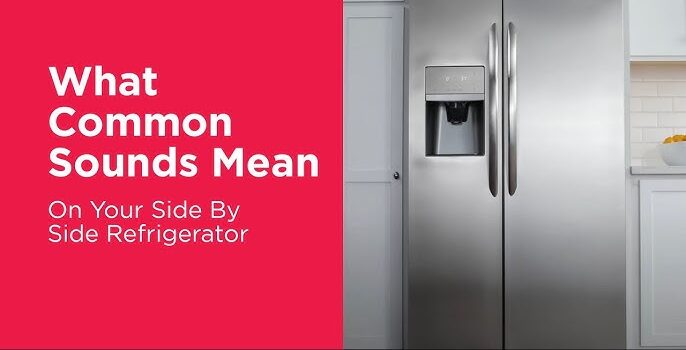Ever caught your fridge humming like a distant engine or clicking as if it’s keeping time? Most sounds are everyday mechanics doing their job; a few hint at parts that need attention. Below, we decode five of the most common refrigerator noises—what they usually mean, simple checks you can do safely, and when it’s time to call a pro.
1) A steady hum or buzz
What it is: The compressor running or the condenser fan moving air across the coils. A gentle hum is normal—modern fridges cycle on and off throughout the day.
When it’s normal
- The hum comes and goes in cycles.
- It’s soft, consistent, and doesn’t change much with door openings.
When to investigate
- The hum turns into a loud buzz that persists for hours.
- The back of the fridge feels unusually hot or the sides are scorching.
Quick checks
- Pull the unit 5–10 cm from the wall to improve airflow.
- Vacuum dust from the rear grille and condenser coils (unplug first).
- Make sure the fridge is level. If it rocks, adjust the front feet.
2) Clicking or soft tapping

What it is: Relays switching the compressor on/off or the defrost timer advancing. Single clicks at start/stop are normal.
When it’s normal
- One or two clicks when cooling starts or stops.
- Occasional ticking during defrost cycles.
When to investigate
- Rapid, repeated clicking every few seconds without cooling.
- Clicking paired with warm compartments or melting ice cream.
Quick checks
- Confirm the outlet is grounded and the power cord is snug.
- Avoid using a high-load extension or multi-plug adapter.
- Check door gaskets: if warm air leaks, the compressor may short-cycle.
3) Gurgling, bubbling, or hissing
What it is: Refrigerant and oil moving through capillary tubes. A light gurgle after the compressor shuts off is typical.
When it’s normal
- Soft, watery gurgles shortly after a cooling cycle.
- A faint hiss during defrost as frost melts.
When to investigate
- Persistent loud hissing along with poor cooling.
- New, sharp bubbling sounds plus frost building unevenly on the evaporator cover.
Quick checks
- Give the fridge a few minutes after closing the door; the sounds often settle.
- Ensure the freezer vents aren’t blocked by food packaging (airflow matters).
- If cooling is clearly weak, skip DIY refrigerant ideas—this is technician territory.
4) Rattling, vibrating, or a metallic clatter

What it is: Loose hardware, a wobbly drip pan, or items vibrating against the cabinet.
When it’s normal
- A light vibration when the compressor starts.
- Occasional rattle if bottles touch each other on a shelf.
When to investigate
- Continuous rattling that changes with floor pressure or door movement.
- A clatter from underneath when the compressor kicks on.
Quick checks
- Level the fridge front-to-back and side-to-side.
- Slide a sheet of paper under each front foot; if one foot doesn’t grip, adjust.
- Inspect the bottom drip pan (unplug first): reseat or pad it if it’s loose.
- Inside, space jars and pans so they don’t touch; check that glass shelves sit fully in their tracks.
5) Squealing, chirping, or a high-pitched whine
What it is: A dry or failing fan motor (evaporator inside the freezer or condenser at the back/bottom). These tones often rise and fall as the fan speed changes.
When it’s normal
- Brief whine during very cold starts in winter rooms—rare but possible.
When to investigate
- A continuous squeal that gets louder when you open the freezer door.
- Whining paired with frost on the back wall or poor cooling.
Quick checks
- Open the freezer; if the noise grows, suspect the evaporator fan.
- Look for frost blankets on the rear panel—heavy frost can make the fan rub ice. Defrost manually by unplugging and leaving doors open (protect floors and food), then address the cause: torn gaskets, blocked vents, or a failed defrost component.
- If the squeal returns after defrost, the fan motor or bearings likely need replacement.
Quick Safety Notes
- Always unplug the refrigerator before cleaning coils, touching fans, or checking pans.
- Use a non-metallic tool around fan blades and wiring.
- Avoid opening sealed system lines (refrigerant work requires certification).
Simple Maintenance That Silences Many Noises
- Clear the coils twice a year (pets = more often). Dust is the enemy of quiet compressors.
- Keep it level. A torpedo level and the adjustable feet work wonders.
- Organize shelves. Prevent bottle-to-bottle vibrations and blocked air vents.
- Mind the load. An overstuffed freezer forces fans to work harder.
- Check gaskets. Close a sheet of paper in the door and tug. If it slides out easily, the seal may be leaking.
